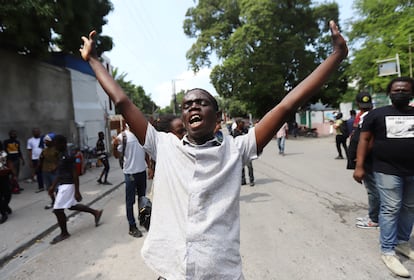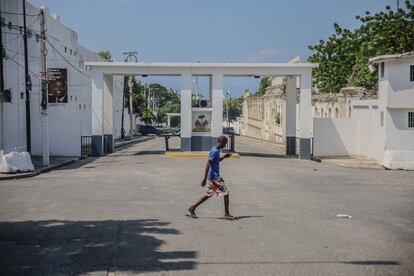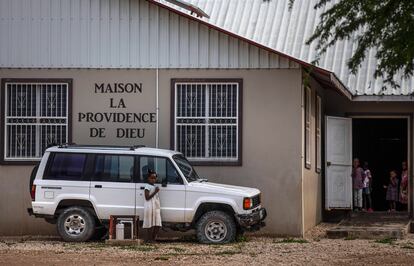Kidnap of 17 North American missionaries in Haiti reflects growing power of violent gangs
The FBI has sent a team to the Caribbean island to investigate the incident while news is awaited of possible ransom demands

They had traveled to Haiti to help, but their philanthropic adventures came to an abrupt end on Saturday, when an armed group kidnapped the 16 American missionaries and their Canadian companion. Between 8 and 10am, a group of heavily armed men set up barricades on Carrefour Boen and La Tremblay streets, on the road to Ganthier that leads to the airport in the capital. They stopped the bus on which the 17 missionaries from Ohio were traveling, after their visit to a children’s hospital. On Monday, a spokesperson from the White House confirmed that the FBI was involved in the investigations into the incident, but gave no further details. State Department spokesperson Ned Price confirmed that a small team of investigators had landed in the country to try to rescue the hostages or negotiate their release.
The gang known as 400 Mawozo is behind the kidnapping. It’s a violent and heavily armed organization that controls the Croix de Buquet area, a neighborhood in Haiti’s capital Port-au-Prince. The group counts on around 150 members, according to organizations that study violence in the Caribbean island. Official sources from the Haitian police have confirmed to EL PAÍS that there had been no contact with the kidnappers to establish the conditions or ransom for a possible rescue.
Meanwhile, tensions were running high on the streets, and on Monday the capital city was host to a massive strike aimed at protesting pretty much everything: violence, the high number of kidnappings, shortages of fuel, high prices for basic foodstuffs and the political vacuum that exists in the country since the assassination in June of the then-president, Jovenel Moïse. In addition to these issues, the Digicel telecommunications company has raised its rates, adding to the charged atmosphere.
“It has been months since we appealed for help, and since we have had no security against kidnappings we have called for the population to suspend all activity,” said Méhu Changeux, the president of Haiti’s association for proprietors and drivers. “The outlaws are breaking all of the limits: they kidnap, they rape women, they do want they want… Enough is enough,” the union leader complained, in comments reported by news agency AFP.

The Caribbean country is managing to survive in large part thanks to the cooperation of these kinds of religious groups, which may end up having to interrupt their activity in the country given the current situation. Even organizations such as Doctors Without Borders (MSF) have reduced their interventions in emergencies, and have stopped operating altogether in some violent neighborhoods given the lack of security.
This year has been particularly tough for Haitians. In the last nine months, there have been 600 registered kidnaps, three times more than in the same period last year, according to the CARDH human-rights group – there have been 29 kidnappings in recent months alone. The ransoms demanded range from $100,000 (€85,700) to $1 million (€857,000).

According to the same organization, 43% of kidnappings take place in Port-au-Prince, 22% in Croix-des-Bouquets, 19% in Carrefour and 16% in Delmas – all of which are located in the metropolitan area of the capital city, where approximately a third of the Haitian population lives.
One of the incidents that spread like wildfire via word of mouth, and reflects the rotten state of this kidnapping industry, was that of a street vendor who was unable to come up with the $4,000 (€3,430) being demanded for the safe return of his daughter by kidnappers who were threatening to kill her.
Haiti is currently a strategic point for arms and drugs that are trafficked in the Caribbean, and as a result kidnapping gangs have gained firepower and are facing off with the police on a nearly daily basis.
As a result of the call for a strike, Monday saw stores and schools close on Monday, and transportation, one of the sectors that has been worst hit by the violence, also ground to a halt. In the afternoon, clouds of dark smoke were seen over a number of areas in the city center, as the number of protestors who were setting fire to barricades in the streets of the capital grew.
“The earthquake [in August of this year] heightened the insecurity in a country that was still on edge due the assassination of President Moïse,” explains InSight Crime, a non-profit journalism and investigative organization specialized in organized crime in Latin America and the Caribbean. “After a brief period of calm, the number of kidnaps has risen again, with victims that include senior government officials and members of the military,” the organization adds, concluding that the danger is not limited to Haiti, but is also endangering nearby countries such as Dominican Republic. “Until a few months ago, the gangs in Haiti were seen as a very dangerous phenomenon, limited just to their country. But their criminal activity has expanded so quickly that other countries have reasons to pay attention to them for a number of reasons,” it warned.
Tu suscripción se está usando en otro dispositivo
¿Quieres añadir otro usuario a tu suscripción?
Si continúas leyendo en este dispositivo, no se podrá leer en el otro.
FlechaTu suscripción se está usando en otro dispositivo y solo puedes acceder a EL PAÍS desde un dispositivo a la vez.
Si quieres compartir tu cuenta, cambia tu suscripción a la modalidad Premium, así podrás añadir otro usuario. Cada uno accederá con su propia cuenta de email, lo que os permitirá personalizar vuestra experiencia en EL PAÍS.
¿Tienes una suscripción de empresa? Accede aquí para contratar más cuentas.
En el caso de no saber quién está usando tu cuenta, te recomendamos cambiar tu contraseña aquí.
Si decides continuar compartiendo tu cuenta, este mensaje se mostrará en tu dispositivo y en el de la otra persona que está usando tu cuenta de forma indefinida, afectando a tu experiencia de lectura. Puedes consultar aquí los términos y condiciones de la suscripción digital.









































